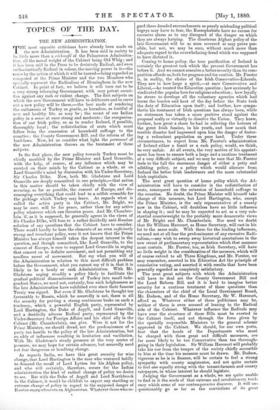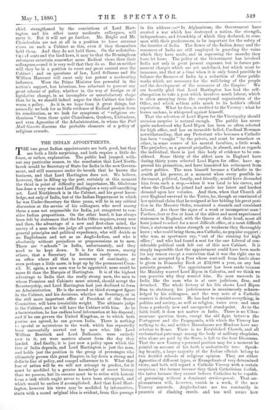TOPICS OF THE DAY.
THE NEW ADMINISTRATION.
THE most opposite criticisms have already been made on the new Administration. It has been said in society to be little more than a reckauffe of the Palmerston Administra- tion, all the moral weight of the Cabinet being Old Whig ; and it has been said in the Press to be decisively Radical, and even enthusiastically Radical in colour, the moving power in it—the screw by the action of which it will be turned—being regarded as composed of the Prime Minister and the two Members who specially represent the Radicalism of Birmingham in the new Cabinet. In point of fact, we believe it will turn out to be a very strong reforming Government, with very potent securi- ties against any rash or violent change. The first subjects on which the new Government will have to deliberate and to carve out a new policy will be these,—the best mode of rendering the euthanasia of Turkey as gentle, as harmless, as fruitful of new and healthy life, as may be ; the recast of our Indian policy in a sense at once strong and moderate ; the reorganisa- tion of our Irish policy, so as to render Ireland, if possible, thoroughly loyal ; the redistribution of seats which must follow from the concession of household suffrage to the counties ; the County Government Bill, and the reform of the land-laws. Now, let us consider what light the personnel of the new Administration throws on the treatment of these subjects.
In the first place, the new policy towards Turkey must be chiefly moulded by the Prime Minister and Lord Granville, -with the help, of course, of any influence which may be exerted on their minds by the Cabinet as a whole, or on Lord Granville's mind by discussion with his Under-Secretary, Sir Charles Dilke. Now, both Mr. Gladstone and Lord Granville are deeply committed to one principle,—that action in this matter should be taken chiefly with the view of securing, as far as possible, the concert of Europe, and dis- couraging everything that could lead to a selfish scramble for the pickings which Turkey may leave. As regards what is called the active party in the Cabinet, Mr. Bright, we may be sure, will be for peace, rather than for any active policy whatever which can threaten peace. And Mr. Chamber- lain, if, as it is supposed, he generally agrees in the views of Sir Charles Duke, will lean to a rather decidedly anti-Russian solution of any questions that the Cabinet have to consider. There would hardly be here the elements of an even sufficiently strong and trenchant policy, were it not known that the Prime Minister has always himself taken the deepest interest in the question, and though committed, like Lord Granville, to the concert of Europe, is sure to support Lord Granville in urging that concert on to definite movement, and not permitting any needless arrest of movement. But say what you will of the Administration in relation to this most difficult problem before the Government, what you cannot say of it is, that it is likely to be a heady or rash Administration. With Mr. Gladstone urging steadily a policy likely to facilitate the gradual political dismemberment of Turkey into small inde- pendent States, we need not, certainly, fear such helplessness as the late Administration have exhibited ever since their famous Treaty was signed. But even if Mr. Gladstone be thought too favourable to Russia, which he assuredly is not, there is all the security for putting a strong continuous brake on such a tendency, which a powerful English party, represented by Lord Harlington, the Duke of Argyll, and Lord Granville, and a decidedly adverse Radical party, represented by the Under-Secretary for Foreign Affairs and his chief ally in the Cabinet (Mr. Chamberlain), can give. Were it not for the Prime Minister, we should dread, not the predominance of a party too hostile to the policy of the late Administration, but an eddy of influences resulting in hesitation and vacillation. With Mr. Gladstone's steady pressure at the very centre of pressure, we may hope for certain advance, but assuredly need not fear dangerous or headlong change.
As regards India, we have this great security for wise change, that Lord Harlington is the man who ventured boldly to demand the recall of Lord Lytton for his Afghan policy, and who will certainly, therefore, secure for the Indian administration the kind of radical change of policy we desire to see. But with the Duke of Argyll and Lord Northbrook in the Cabinet, it would be childish to expect any startling or extreme change of policy in regard to the supposed danger of Russian encrolciiment4 on Afghanistan. Whatever those who re-
gard these dreaded encroachments as purely misleading political bogeys may have to fear, the Russophobists have no excuse for excessive alarm as to any disregard of the danger on which they are always harping. The disastrous Afghan policy of the late Government will be as soon reversed as may prove pos- sible, but not, we may be sure, without much more than adequate regard to the overwhelming dread which was supposed to have dictated it.
Coming to home policy, the true pacification of Ireland is certainly the greatest task which the present Government has before it. And we cannot conceive a bettersecuritv than its com- position affords us, both for progress and for caution. Mr. Forster is, in reality, the choice of the Irish Conservative-Liberals. They saw in how large a spirit,—at once Conservative and Liberal,—he treated the Education question ; how anxiously he vindicated the popular love for religious education ; how loyally he strove to develope all the voluntary agencies which had borne the burden and heat of the day before the State took the duty of Education upon itself ; and further, how sympa- thetic his treatment of Irish questions has always been, while no statesman has taken a more positive stand against the proposal really or virtually to dissolve the Union. They knew, further, how great a share he had in relieving the horrors of the great Irish famine, in his youth, and how much that terrible disaster had impressed upon him the danger of foster- ing a redundant population on poor land. Under these circumstances, to expect from Mr. Forster's administration of Ireland either a timid or a rash policy, would, we think, be very unfair. At all events, the very motive of his appoint, ment has been to ensure both a large and a cautious treatment of a very difficult subject, and we may be sure that Mr. Forster feels to the full the enormous danger of either a petty and nibbling policy, or a policy which would alienate from Ireland the better Irish landowners and the more substantial Irish capitalists.
The next great question of home policy which the Ad- ministration will have to consider is the redistribution of seats, consequent on the extension of household suffrage to the counties. No doubt, the Prime Minister will himself take charge of this measure, but Lord Hartington, who, except the Prime Minister, is the only representative of a county now in the Cabinet, will doubtless have no little influence in shaping it ; and he may be expected to act as a very sub,- stantial counterweight to the probably more democratic views of Mr. Bright and Mr. Chamberlain. Nor need we doubt that Sir William Harcourt, as Home Secretary, will cast in his lot to the same scale. With these for the leading influences, we need not at all fear the predominance of any excessive Radi- calism,—any wish to sweep away historical associations in the new recast of parliamentary representation which that measure. must contain. Mr. Forster, too, as Irish Secretary, will have no little weight in the consideration of the measure, which wilt of course extend to all Three Kingdoms, and Mr. Forster, we may remember, asserted in his Education Act the principle of cumulative voting, and asserted it with results that have been generally regarded as completely satisfactory.
The next great subjects with which the Administration will have to deal are the County Government Bill and the Land Reform Bill, and it is hard to imagine better security for a cautious treatment of these questions than the characters of the chief of the Local Government Board, Mr. Dodson, and of the Home Secretary, Sir W. Harcourt, afford us. Whatever either of these politicians may be, neither of them is even accused of leaning to the Radical side of the Cabinet. Whatever influence the Radicals may have over the structure of these Bills must be exerted in the Cabinet itself, and not through the form given by the specially responsible Ministers to the general scheme approved in the Cabinet. We should, for our own parts, fear that the heads of the Departments who must be charged with these great and difficult measures, are far more likely to be too Conservative than too thorough- going in their legislation. Sir William Harcourt will probably take his cue from the temper of the society chiefly accessible to him at the time his measure must be drawn. Mr. Dodson, vigorous as he is in finance, will be certain to feel a strong sympathy with county magistrates, and not quite certain to feel one equally strong with the tenant-farmers and county ratepayers, in whose interest he should legislate.
Judging the Government as a whole, we are quite unable to find in it the seeds of that extreme and revolutionary. tend- ency which some of our contemporaries discover. It will un- questionably go as far as the convictions of its great
chief, strengthened by the convictions of Lord Hart- ington and his other many moderate colleagues, will carry it. But it will not go further. Mr. Bright and Mr. Chamberlain are not at all in a position to force extreme views on such a Cabinet as this, even if they themselves held them. And they do not hold them. On the redistribu- fol of seats and the land-laws, it may be that the Birmingham reformers entertain somewhat more Radical views than their colleagues,—and it is very well that they do so. But on neither will they be in a position to exert any great control over the Cabinet ; and on questions of law, Lord Selborne and Sir William Harcourt will exert only too potent a moderating influence. Were the Prime Minister less powerful in the nation's support, less laborious, less reluctant to present any great scheme of policy, whether in the way of foreign or of legislative change, in an incomplete or unsatisfactory shape than he is, we should indeed augur for this Cabinet too luke- warm a policy. As it is, we hope from it great things, but assuredly we look for as little evidence of Radical passion from its constitution, as we look for symptoms of "religious en- thusiasm" from those quiet Churchmen, Quakers, Unitarians, and even Agnostics of the Administration, in whom the Pall Nall Gazette discerns the probable elements of a policy of religious crusade.



































 Previous page
Previous page